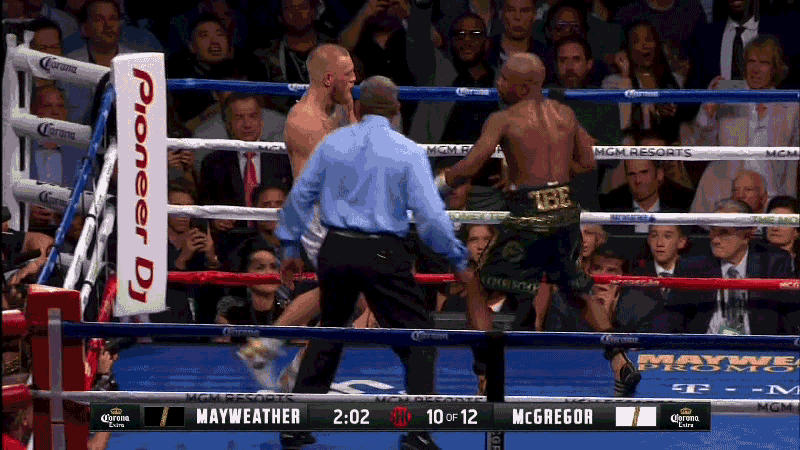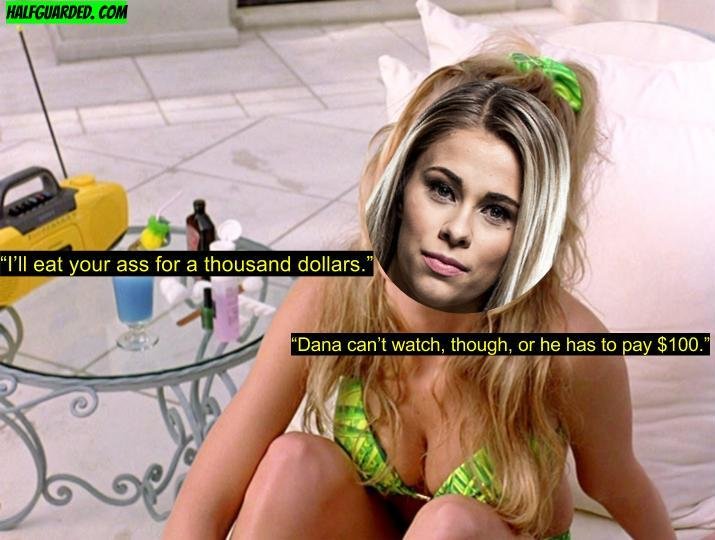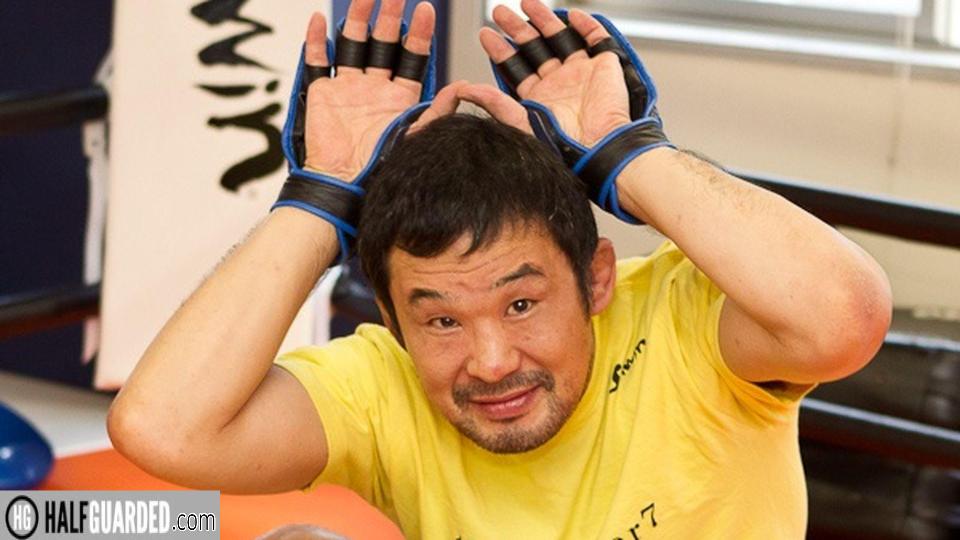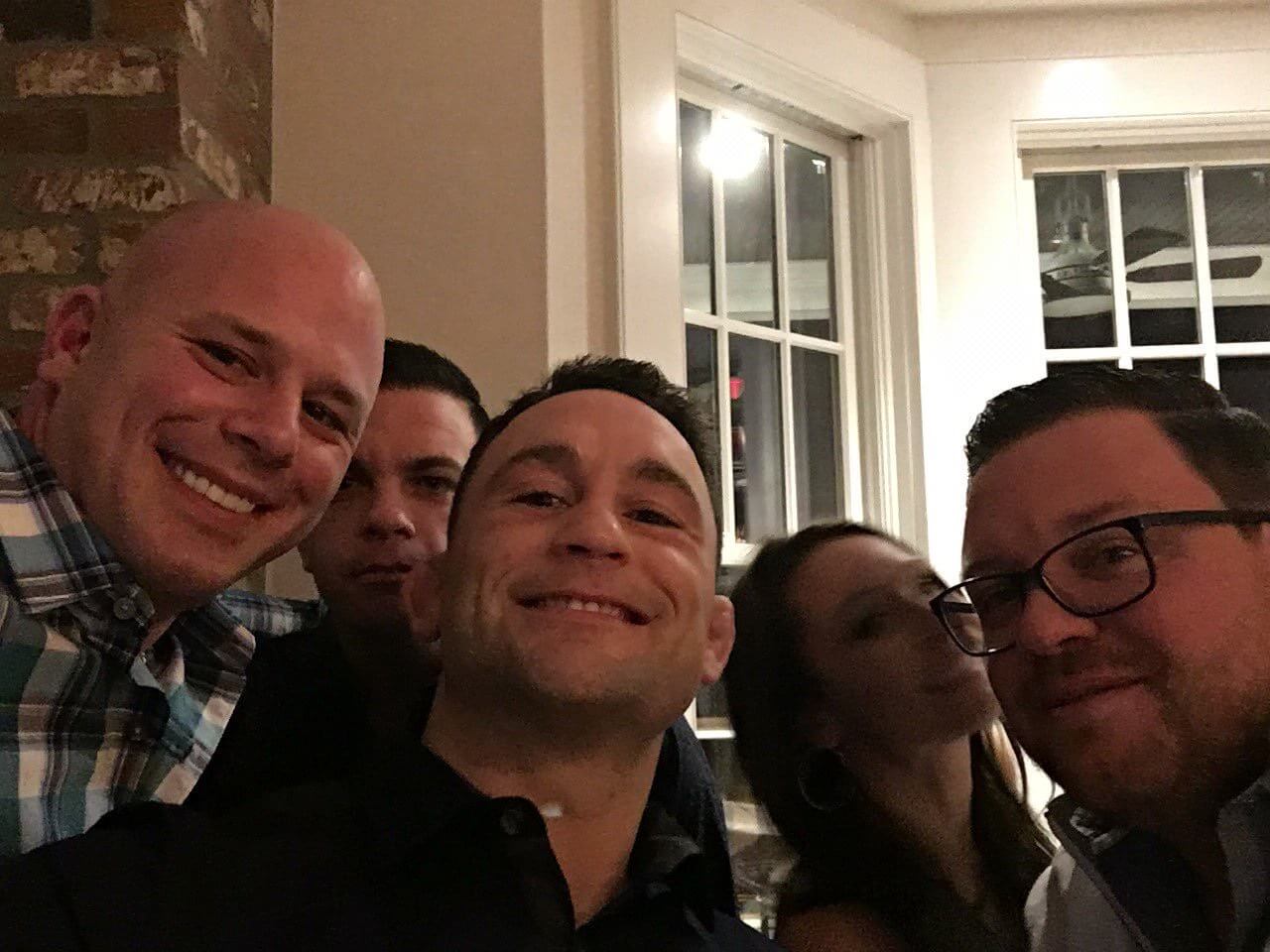Paradigm shifts, the popular definition goes, are sudden events that instantly herald the arrival of a new era and signify the close of the old world order. Pearl Harbor, the JFK assassination, 9/11 – these are the moments that immediately let us know our former way of life was an antiquity and that we could never return to “business as usual,” no matter how badly we yearned for the comfortable predictability of yesterday.
In may not seem like it right now, but Mayweather/McGregor was indeed a similar paradigm shift – not just for combat sports, but in many ways, consumerism, technology and American society itself.
The most obvious initial impact is a financial one. As of the writing of this article, the official PPV numbers have yet to be released, but most analysts are predicting the range to be around the 5 million purchase mark. Factoring in the historic live gate take, the total amount of gross revenue generated by the show could eclipse $1 billion. Mayweather and McGregor were already stinkin’ rich before last Saturday, and with their combined $130 million disclosed purse, it doesn’t look like either of them will be fiscally hurting for the rest of their lives – or their children’s lives, or their grandchildren’s’ lives, for that matter.
Mayweather has officially retired at 50-0. If he’s not a billionaire by now, odds are he’ll be one very, very shortly. As a full-time promoter, it wouldn’t surprise me one iota if he and Dana White came to some kind of agreement for future partnerships, be it UFC crossover boxing bouts or joint MMA/boxing mega-shows. Both these men have a LOT more money to make, and the humongous fiscal windfall from the weekend might just be the tip of the proverbial iceberg.
Hardly anybody expected McGregor to do as well as he did in the contest. In a fight that made it to the tenth round, the Irishman won perhaps as many as four or five frames; indeed, he looked far more impressive against Mayweather than any number of boxing royals, including Manny Pacquiao (who landed less shots against Floyd in a fight that went the distance than McGregor did in just nine rounds.)
McGregor – the biggest MMA breakout star of all-time, bar none – now finds himself at the crossroads. Does he return to the UFC or does he go full-time as a boxer, picking and choosing lesser opponents for monumentally higher paydays? Reason would seem to dictate Conor would go with the latter as opposed to the former. Why would anybody risk permanent injury against Khabib Nurmagomedov or Tony Ferguson for a $5 million payday ($10 million, tops) when you could just as easily ink a contract to box Paulie Malignaggi in Yankee Stadium on St. Paddy’s Day for $40 or $50 million? WME has accrued so much debt just purchasing the UFC that it seems unlikely – if not impossible – for them to finally start paying their PPV headliners Canelo Alvarez money.
https://twitter.com/SHOsports/status/901693734810640384
And that’s where things get interesting. One could argue that the UFC only has five guaranteed PPV-caliber stars: McGregor, Rousey, Lesnar, Jones and St-Pierre. And as odd as it sounds, St-Pierre is the only one who seems likely to appear at a UFC PPV in 2018. With such a profound lack of starpower on the roster, the UFC may be forced to back up the Brinks truck to McGregor’s front door, which in turn creates another powderkeg scenario. With the UFC doling out $20 to $30 million for McGregor bouts, just how long will fighters like Demetrious Johnson, Amanda Nunes and Stipe Miocic settle for their $225,000 PPV headliner checks? In such a scenario, it’s not hard to envision a mass UFC exodus, with half the undercard checking out for greener pastures – and I’m not talking about Bellator. Surely, such would never benefit a hypothetical Dana White-operated and Floyd Mayweather-bankrolled UFC competitor, would it?
Last Saturday’s hullaballoo certainly helped the world of boxing more than it did MMA. McGregor could easily become the sport’s biggest PPV draw just taking on random tomato cans, and there are plenty of bankable boxers with sellable personalities and entertaining styles – GGG, Canelo, Keith Thurman, Tyson Fury, Deontay Wilder, Anthony Joshua, Andre Ward, Terence Crawford, etc. – sitting on the sidelines waiting for the next big payday PPV bout. If absolutely nothing else, Mayweather/McGregor reminds us that boxing is still the most transcendent of all sports. It doesn’t matter what culture you belong to, what language you speak or what color your skin is, everybody can understand, enjoy and appreciate the violent ballet of dudes trying to punch one another’s lights out. This freak show of a match-up that turned into one of the most freakishly GOOD boxing bouts in recent memory may have rekindled Americans’ love affair with the Sweet Science, or, at the absolute least, piqued its interest in what the “real” boxing scene nowadays resembles – the receipts for the upcoming Canelo/GGG bout will be quite telling.
But the great takeaway for the world of MMA after May/Mac? Well, worst case scenario, it means losing its biggest star ever, and best case scenario, it sets into motion long-term undercard turmoil that could pave the way for new MMA organizations to drain the UFC of its underpaid talent. Either way, the Mayweather/McGregor fallout is unlikely to do much fiscal good for the UFC … and, as impossible as it sounds now, might be the fatal first step of its slow and painful dissolution as the world’s premier mixed martial arts promotion.
About last night .. pic.twitter.com/grD7gEsML1
— UFC (@ufc) August 27, 2017
That’s not the only way Mayweather/McGregor has reshaped our world, though. While the combat sports arena is the most tangibly impacted sector of American life in the wake of the mega-money match, it’s not difficult to use the event as a bellwether for several other aspects of our changing society.
It wasn’t just a bunch of adroitly crafted marketing hype – people were genuinely excited about the fight, including people who not only don’t regularly watch boxing or MMA, but many who have never watched a single boxing match in their lives.
That was evident when I walked into a bakery on Saturday morning and saw no less than three custom ordered cakes shaped like boxing rings, including one that had a bloody Conor McGregor action figure lying facedown on the blue, frosted canvas. That was evident when the PPV servers crashed in many parts of the country because so many people were ordering it at the same time. That was evident when the subreddit for live boxing streams was inundated with a quarter million users at fight time. And that was especially evident when thousands of Periscope feeds of the PPV started garnering viewers in the five and six digits. Even if they weren’t paying for the show, by golly, people WANTED to watch it as it happened. Hell, even my girlfriend – who has had an aversion to all things fight-related ever since I took her to a sports bar to watch Mark Hominick turn into the Elephant Man in a bout against Jose Aldo – clicked out of Pinterest long enough to watch it with me. This was a major, major social event, easily on par with the Super Bowl, the World Cup or the Oscars. Which, naturally, aroused the armchair sociologist in me: what exactly made this particular fight so appealing to non fans of boxing or MMA?
Well, a brief chat with a random 300-pound guy waiting to get scrambled eggs in the buffet line at a HoJo’s in Macon, Ga. three days before the bout explained it in full.
He was wearing a Showtime Boxing shirt, so I casually asked him who he thought would win. “I don’t know, man,” he replied. “All I know is that they’ve been talking some mad shit about each other, bro, and I know they’re really going to try to whup each other’s asses.”

That, in a nutshell, explains why Mayweather/McGregor became the social phenomenon it was; because we’re a society absolutely obsessed with unscripted conflict. Maybe we’re vicariously trying to escape from our boring, buttoned-down, office politics uber alles existences, or maybe we’re just sick of synthetic outrage and moral indignation. Try as they may, political pundits like make-believe black person Shaun King couldn’t just scream “racism” as the reason why this particular fight captured the hearts and minds of the masses. Everybody from the Aryan Nations to the Huey Newton Gun Club to MS-13 to Hezbollah to the Church of Jesus Christ Latter Day Saints were entranced by the match-up, and it wasn’t because of ethnic or religious tribalism.
The laity got involved in May/Mac for the very same reason they get involved in news coverage of the Alt-Right and Antifa beating the hell out of each other on the streets of Berkeley. The same prevailing pop culture populism that made the Trump/Clinton debates must-watch-TV was the same driving force behind May/Mac-Mania. The huddled masses came out in droves for McGregor/Mayweather for the very same reason the Twitter-verse is so deeply invested in Taylor Swift’s three-front social media war against the KKK (that being, Katy Perry, Kim Kardashian and Kanye West.) We’re so used to phoniness, insincerity and pretentiousness in EVERYTHING the media shoves down our throats that the moment we catch a taste of anything that might be remotely authentic, we jump for joy. And the fact May/Mac delivered what it promised instead of giving the hoi polloi an Ali vs. Inoki trainwreck or a crass bait-and-switch like that one TV special about Michael Phelps racing a CGI shark made it all the more memorable as a cultural event.
Those cynical sorts who likened the match-up to P.T. Barnum hokum on par with that Discovery Channel show about a dude (not) being eaten by an anaconda totally missed the point. Neither morbid curiosity nor Schadenfreudist smarminess can explain the transcendent appeal of the “money fight.” It was two of the biggest (and mouthiest) personalities in all of sports – representing the professional apex of their respective careers – stepping inside a ring to settle their differences with blunt force trauma after months (hell, maybe even years) of triple A trash talk. That entire sports arenas were sold out just to listen to the two men call each other “punks” and “faggots” should clue you in as to why America, if for but a brief moment in time between the Charlottesville riots and Hurricane Harvey, came together as one : simply put, real animosity sells, and if you’re willing to cap off the vehemence with explosive (yet mutually agreed upon and regulated) interpersonal violence, the people, they will come.
Before May/Mac, you might consider the U.S. to be a “bread and circuses” society. Well, after last Saturday, I think it’s safe to say we’re now a corn chips and violence culture; and undoubtedly, some people are going to become very, very wealthy from capitalizing on the post-social-and-solid-state-media society’s penchant for commodified conflict.





